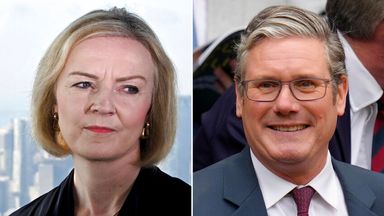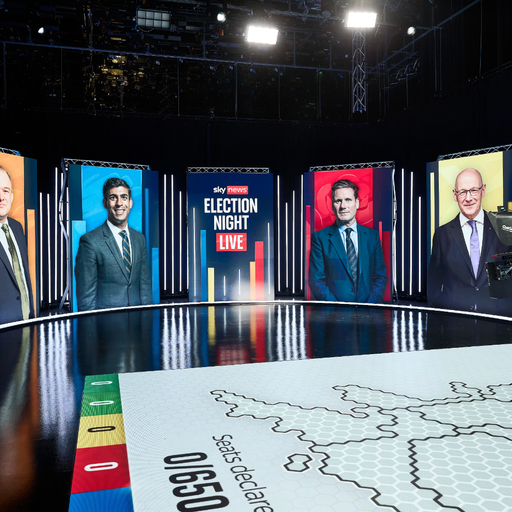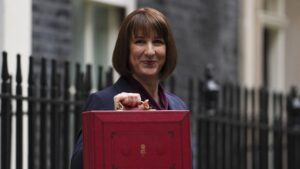How much is Liz Truss to blame for expensive mortgages and higher interest rates?
More than 104,000 people signed up for a mortgage two months following Liz Truss’s premiership, likely fixing to a higher rate as a result.

Her time at the top of the Conservative Party memorably ended just 42 days after becoming prime minister, yet Liz Truss has been a name frequently heard throughout general election debates.
The Labour Party hoped to remind voters of the unfunded tax cuts and spending plans announced in the September 2022 mini-budget which caused government borrowing to soar and necessitated an intervention by monetary regulator the Bank of England to prevent a collapse of pension funds.
The party has bet that associating current-day Tories with Ms Truss and her economic plans will be a vote winner. The party wants voters to think it’s Ms Truss’s mini-budget that sharply brought rates up,
But is it right to attribute more expensive borrowing to Liz Truss? It is and it isn’t.
Can we blame Truss for mortgage bills?
The average new mortgage rate rose significantly in the days, weeks and months following the mini-budget as lenders feared the Bank of England would make borrowing more expensive via elevated interest rates and uncertainty meant banks and building societies pulled
Her unfunded tax cut policies aimed to put more money into pockets when the central bank was trying to take money out of the economy to bring down inflation, which in the month of the mini-budget stood at 10.1% – five times the Bank’s target.
Labour have said monthly mortgage payments increased by £221 in the nearly two years since Ms Truss’s policy announcement, according to their analysis of Office for National Statistics (ONS) data.
How many were likely impacted?
During the period where mortgage lending was most volatile – the two months after the 23 September policy announcement – 104,100 people signed up for new mortgages, according to Bank of England data for October and November 2022.
Fewer people than before were taking out mortgages during those months due to the instability, so lending was not at usual levels. Were this a typical October or November it’s likely more mortgage borrowing would have taken place as the overall monthly average up to February 2020 was 66,700.

Keep up with all the latest news from the UK and around the world by following Sky News
While pandemic-era savings and the desire for space created a house-buying boom October and November 2022 mortgage approval figures were significantly down from 2021 numbers. After a five-month run starting from September 2022 mortgage approvals reached a low not seen since January 2009, the time of global financial crash, Bank of England money and credit figures showed.
And those figures don’t include the number of people who are remortgaging.
It is, however, possible that those more than 100,000 new mortgagors would have had cheaper rates if there were no market turmoil in the bond market and pensions industry.
Through most of October and November 2022 mortgage rates mostly remained above 6% for the average two and five-year deal – more than double the 3% base interest rate set by the Bank – according to figures from financial information website Moneyfacts.
Given the market chaos that followed the mini-budget policies and the fact interest rates hadn’t yet been hiked to a 15-year high.
What else was going on
But the biggest interest rate hike of the current cycle of rises came right after Ms Truss stood down on 20 October and it was that month when inflation reached its recent peak and 40-year high of 11.1%.
It can be argued Ms Truss’s actions made this sharp rate raise more likely, which then kept mortgage rates expensive.
The key cause of inflation was sky-high energy costs and it’s the Bank that’s tasked with bringing it under control. Its monetary policy intervention – to up the interest rate by 0.75 percentage points rise was the biggest increase at any one point in time since 1992.
More incremental increases of 0.5 and 0.25 percentage points are the norm.
When making the decision the impact of so-called Trussonomics was indirectly mentioned by Bank of England governor Andrew Bailey when he spoke of a “UK premium” that meant borrowing was uniquely more expensive in the UK compared to the US or EU.
It’s important to note that mortgage rates were already going up, according to Moneyfacts figures from the time, as inflation was steadily on the up as was the expectation that the Bank would act by making borrowing more expensive.
Lenders were responding to those cues and pricing their mortgage products accordingly. On the day of the mini-budget, the typical mortgage rate on the average two-year fixed deal was 4.74% and 4.75% to fix for five years.
You can’t discount Truss
Inflation can’t be blamed on Ms Truss – after the energy price shock as Western countries weaned off Russian fossil fuel imports and COVID-era lockdowns made shipping goods trickier, inflation has been a global problem.
So higher interest rates can’t be pinned on her.
Nonetheless, during her short time in office, the expectations for the Bank’s interest rate in the coming year rose from less than 4% to around 6%.
It’s hard to attribute the pulling of mortgage products and rapid rise to 6% for two and five-year fixed deals to any other cause than the fallout from Ms Truss’s 23 September announcement.
Be the first to get Breaking News
Install the Sky News app for free


Ms Truss declined to apologise to homeowners for higher interest rates but did acknowledge she and her government lost the confidence of financial markets.



